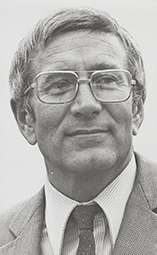Jim Weaver (Oregon politician)
James Howard Weaver (born August 8, 1927) is a former Democratic U.S. congressman from Oregon.
James H. Weaver | |
|---|---|
 | |
| Member of the U.S. House of Representatives from Oregon's 4th district | |
| In office January 3, 1975 – January 3, 1987 | |
| Preceded by | John Dellenback |
| Succeeded by | Peter DeFazio |
| Personal details | |
| Born | August 8, 1927 Brookings, South Dakota, U.S. |
| Political party | Democratic |
Early life
Weaver enlisted in the United States Navy at the age of seventeen and served in World War II on an aircraft carrier in the Pacific.[1] Weaver moved to Oregon from Des Moines, Iowa, in 1947 to attend the University of Oregon. Prior to entering Congress, Weaver worked for a publishing company. In 1959, he was hired as a staff member for the Oregon Department of Agriculture. In 1960, Weaver was hired by a real estate development company, eventually becoming a developer of apartment and office buildings. He was a delegate to the 1960 and 1964 Democratic National Conventions.
Political career
In 1974, Weaver defeated incumbent Republican congressman John R. Dellenback to become the United States Representative from Oregon's 4th congressional district. He was known for conducting the only filibuster in the modern history of the House of Representatives by adding 113 amendments to a Washington Public Power Supply System bill in 1980.[2] After the filibuster, the House passed "The Weaver Rule" to "limit" the use of such tactics.[3]
In 1986, Weaver was selected as the Democratic nominee for United States Senate and was to face incumbent Republican Bob Packwood. After receiving the nomination, however, Weaver was the subject of a House Ethics Committee probe into his campaign finances, and withdrew his candidacy when it became apparent that he would lose the general election. Oregon State Representative Rick Bauman was selected to replace Weaver on the ballot, and lost to Packwood. The House Ethics Committee ruled that Weaver had used campaign money for personal investments, in violation of House rules.[4] Eventually it was discovered that the report had included errors. The House Ethics Committee later stated that Weaver had not violated the law.[5] Weaver served out his term and was succeeded by his aide, Peter DeFazio.
Legacy
In 2008, a trail around Oregon's Waldo Lake was named after the former Congressman.[6]
References
- Taylor, Ted. Voice of Conscience: Jim Weaver speaks out on war, elections, the environment, and 'two kinds of people.' October 24, 2002, accessed November 15, 2006.
- James Weaver (24 December 2012). "How a House filibuster killed nuclear plants". The Register-Guard. Retrieved 24 December 2012.
- Kurtz, Howard. "Controversy No Stranger To Weaver." The Washington Post, May 21, 1985: A17.
- Panel Says Oregon Democrat Violated House Ethics Rules. New York Times. October 8, 1986.
- None, None. "Clarification Weaver Report Erred." The Oregonian, August 24, 1991: A19.
- Palmer, Susan. "Honored for land he fought to protect." Register Guard, September 30, 2008: B1, B3.
Further reading
- Weaver, James (February 28, 1985). "The Town That Was Poisoned" (PDF). Congressional Record. Washington, D.C.: United States Government Printing Office. 131 (3–4): Pages 4185–4189, 99th United States Congress, 1st Session.
- Weaver, James (April 24, 2001). "Slow Medical Sleuthing". The New York Times. The New York Times Company. Retrieved 2007-11-23.
External links
| Wikimedia Commons has media related to James H. Weaver. |
| Wikisource has original works written by or about: Jim Weaver |
- United States Congress. "Jim Weaver (id: W000227)". Biographical Directory of the United States Congress.
- Appearances on C-SPAN
| Party political offices | ||
|---|---|---|
| Preceded by Ted Kulongoski |
Democratic nominee for U.S. Senator from Oregon (Class 3) 1986 |
Succeeded by Rick Bauman |
| U.S. House of Representatives | ||
| Preceded by John R. Dellenback |
Member of the U.S. House of Representatives from Oregon's 4th congressional district 1975–1987 |
Succeeded by Peter DeFazio |
